Exclusive: Testing Intel's Unreleased Core i9-9900KS
We take Intel's unreleased Special Edition Core i9-9900KS for a benchmarking spin.
Core i9-9900KS Ashes of the Singularity and Far Cry 5
Our stock setups for both AMD and Intel processors use the vendor-specified stock memory frequency. We present the 'Core i9-9900K @ 5.0 GHz DDR4-2666' entry so you can compare an overclocked -9900K to the stock KS model at 5.0 GHz with the same memory settings. It's noteworthy that these two configurations should not be used for IPC comparison because the Core i9-9900K is locked to a static configuration, while the -9000KS is running in its native mode and subject to clock fluctuations.
We tested the other overclocked -9900K/S models at DDR4-3600 to highlight the performance advantages of memory tuning.
The stock Core i9-9900KS is marked with "CL" to denote that we used a custom water cooling loop for these tests.
Test results annotated with "PBO" reflect performance with AMD's auto-overclocking Precision Boost Overdrive feature activated. Those configurations also run at DDR4-3600.
| Memory | Chart Entry |
|---|---|
| DDR4-2666 | Core i9-9900KS CL, i9-9900K, 9900K @ 5.0 DDR4-2666, Ryzen 7 3700X, Ryzen 9 3900X |
| DDR4-3600 | Core i9-990KS @ 5.2, Core i9-9900K @ 5.0, Ryzen 9 3900X PBO, Ryzen 7 3700X PBO |
Ashes of the Singularity: Escalation
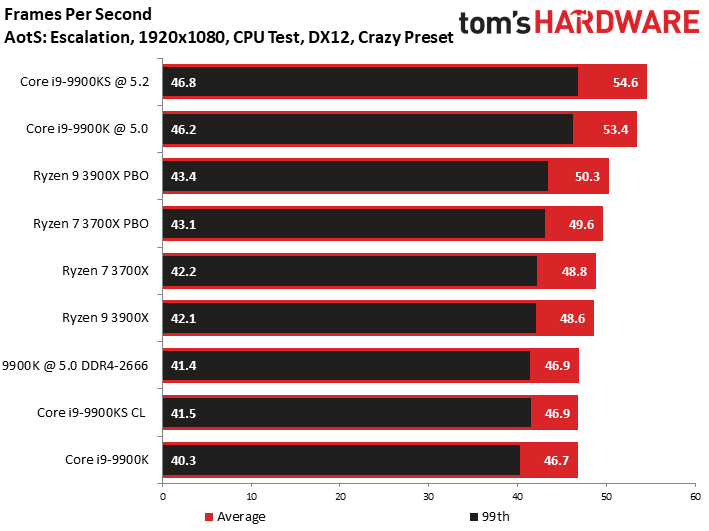
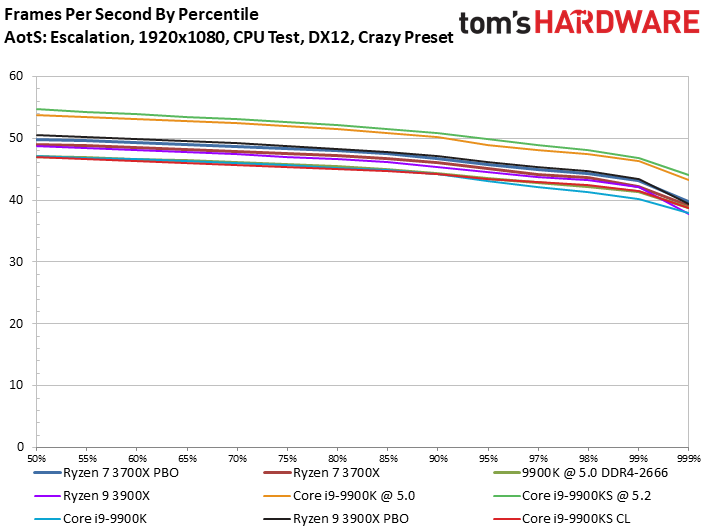
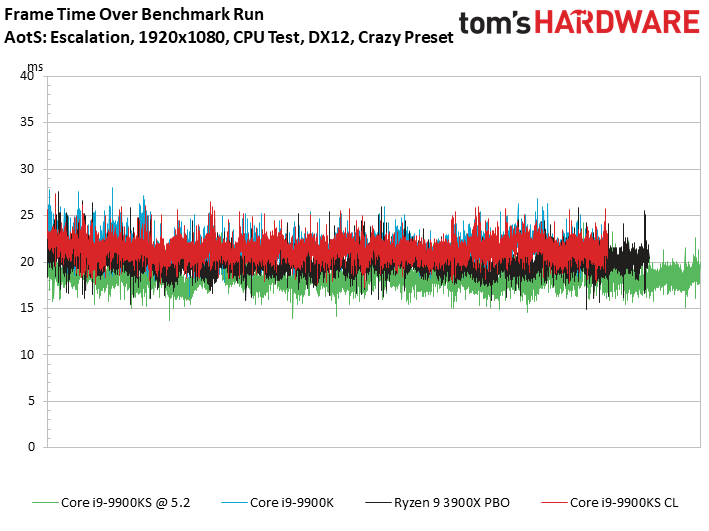
The stock Core i9-9900KS matches the overclocked -9900K step for step with normalized memory settings, while tuning both the chip's cores and memory allows it to take a decent lead over the fully-overclocked -9900K, not to mention the overclocked Ryzen 9 3900X.
At stock settings, however, the -9900KS's gain over the stock -9900K is slight. That's partly because much of the gain from overclocking with this title stems from increased memory data transfer rates.
Far Cry 5
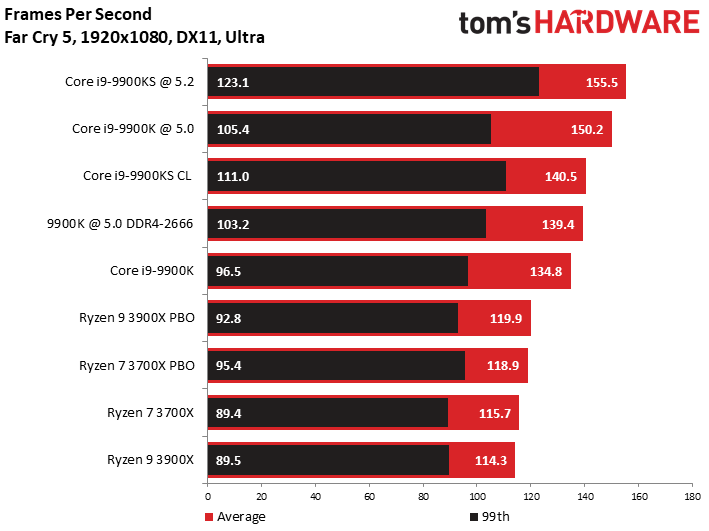
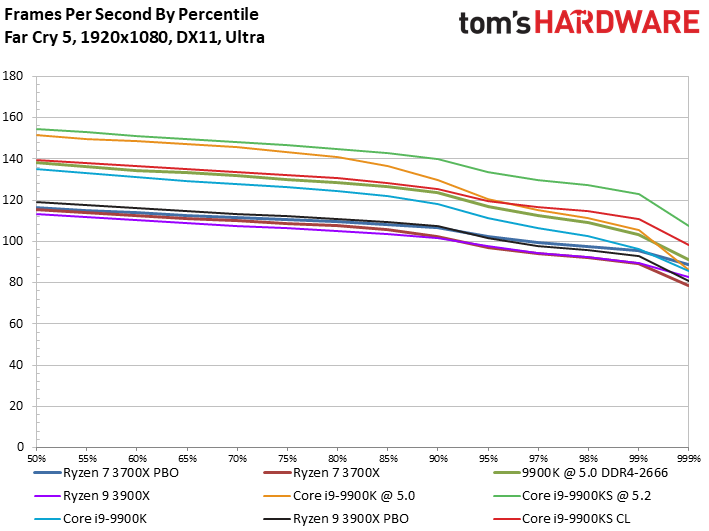
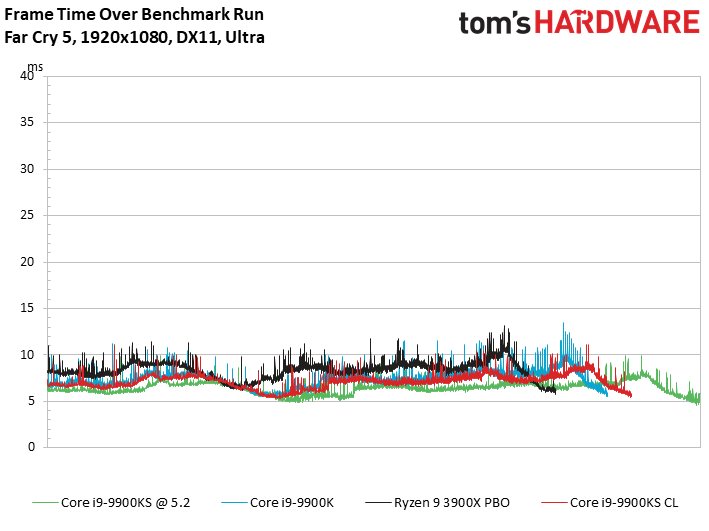
We see much the same trend with the Far Cry 5 benchmark results. The stock -9900KS outstrips the overclocked -9900K by a slim margin with normalized memory data transfer rates, and tuning to 5.2 GHz affords it an easy lead over its less-expensive counterpart. We also see a larger delta between the stock -9900K and the KS model.
Get Tom's Hardware's best news and in-depth reviews, straight to your inbox.
AMD's Ryzen processors aren't as nimble in this benchmark and land at the bottom of the chart.
MORE: Best CPUs
MORE: Intel & AMD Processor Hierarchy
MORE: All CPUs Content
Current page: Ashes of the Singularity and Far Cry 5
Prev Page IPC, Overclocking, Power, and Test Setup Next Page Final Fantasy XV and Grand Theft Auto V
Paul Alcorn is the Editor-in-Chief for Tom's Hardware US. He also writes news and reviews on CPUs, storage, and enterprise hardware.
-
nitrium Yet another super underwhelming Intel release. I guess they'll up their game next gen, but at the price they're asking for it, it's at best "meh".Reply -
Aspiring techie There's almost zero reason to buy this CPU if the rumored price is accurate. It's only for those who want the absolute best gaming experience. For almost every other usage case in the $500 price bracket, the 3900X is the clear winner.Reply
I still find it funny that AMD's 12 core CPU consumes less power than Intel's 8-core. My how the times have changed... -
jimmysmitty ReplyAspiring techie said:There's almost zero reason to buy this CPU if the rumored price is accurate. It's only for those who want the absolute best gaming experience. For almost every other usage case in the $500 price bracket, the 3900X is the clear winner.
I still find it funny that AMD's 12 core CPU consumes less power than Intel's 8-core. My how the times have changed...
Considering the clock speed difference and that while its not quite 7nm it is still a smaller node than Intels 14nm its not surprising at all. If anything its to be expected. If Intel was using less power with a massive clock speed advantage on a larger process then something would be wrong. -
Aspiring techie Reply
I totally agree. 7nm especially has been a huge advantage on that front. It's just that AMD CPUs have traditionally been power hogs while Intel has been fast and power efficient. I find it funny that the roles are somewhat reversed now.jimmysmitty said:Considering the clock speed difference and that while its not quite 7nm it is still a smaller node than Intels 14nm its not surprising at all. If anything its to be expected. If Intel was using less power with a massive clock speed advantage on a larger process then something would be wrong. -
mitch074 Reply
"Power hog" is relative - at the time of the Athlon XP, the Pentium 4 had a secondary role as a room heater.Aspiring techie said:I totally agree. 7nm especially has been a huge advantage on that front. It's just that AMD CPUs have traditionally been power hogs while Intel has been fast and power efficient. I find it funny that the roles are somewhat reversed now. -
vinay2070 9900K @5Ghz performs better than 9900KS @5GHz and costs lesser ? OMG! I understand there are bug fixes, but the cost increase for very little performance increase, that too at 5.2GHz OC is not worth it IMHO. For the price of this CPU, I can get the 3700X/Mobo/16GB ram and it does not make a lot of difference at 1440P anyway.Reply -
unityole Replyadmin said:We take Intel's unreleased Special Edition Core i9-9900KS for a benchmarking spin.
Exclusive: Testing Intel's Unreleased Core i9-9900KS : Read more
is it possible to have Paul also test these new chips with mitigation on how they affect PCIe SSD performance? -
Bassben004 Reply
Another typo is the 49.95 per thread price for the 3900X. 499/24=49.95?? The whole point of this was to try and act like Intel was releasing a competitive product, but they are just pulling the same stuff as when they did the 8086K. A special bin for <2% increase and more $$mamasan2000 said:AMD 3900X is not a 14nm CPU. Guess that is a typo, should be 7 nm.